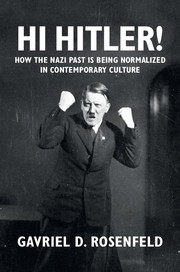Book contents
- Frontmatter
- Contents
- List of Figures
- Acknowledgments
- Introduction
- 1 A “good war” no more: The new World War II revisionism
- 2 From history to memory and back again: Debating the Holocaust’s uniqueness
- 3 Probing the limits of speculation: Counterfactualism and the Holocaust
- 4 Nazis that never were: new alternate histories of the Third Reich
- 5 Humanizing Hitler: the Führer in contemporary film
- 6 Between tragedy and farce: Nazism on the Internet
- Conclusion
- Notes
- Bibliography
- Index
2 - From history to memory and back again: Debating the Holocaust’s uniqueness
Published online by Cambridge University Press: 05 December 2014
- Frontmatter
- Contents
- List of Figures
- Acknowledgments
- Introduction
- 1 A “good war” no more: The new World War II revisionism
- 2 From history to memory and back again: Debating the Holocaust’s uniqueness
- 3 Probing the limits of speculation: Counterfactualism and the Holocaust
- 4 Nazis that never were: new alternate histories of the Third Reich
- 5 Humanizing Hitler: the Führer in contemporary film
- 6 Between tragedy and farce: Nazism on the Internet
- Conclusion
- Notes
- Bibliography
- Index
Summary
As far as historical scholarship is concerned, the uniqueness “debate” has lost most of its steam.
Donald BloxhamTrendspotting is a risky activity, especially when it comes to history. It is hard enough to identify the causal factors that shape the past, let alone speculate about how it may evolve in the future. During the Cold War, Eastern Europeans living under communism knew better than to try and predict the past, being aware that their governments routinely rewrote it to fit changing needs, airbrushing out those who had become discredited and rehabilitating those who had come back into favor. In the liberal democratic West, by contrast, there have been fewer inhibitions about predicting the past. Especially since the rise of postmodernism, Western academics have prided themselves on their self-reflexive awareness about the forces that shape historical scholarship. Most scholars today consider themselves well informed about how history is subjectively constructed; how the past takes shape in collective memory; and how historiographical trends come and go. All of these skills belong to the repertoire of a scholar like Donald Bloxham and inform his observation that the debate on the Holocaust’s uniqueness may have run its course. Whether or not it is accurate, however, is another question.
At first glance, the claim seems persuasive. Many Holocaust historians have made similar assertions in recent years. Alon Confino has written that the idea of the Holocaust’s uniqueness “has lost its intellectual and emotional power … among scholars.” A. Dirk Moses has agreed, noting that “the genocide studies community has already conducted the debate about … uniqueness … and has moved onto other research questions.” This scholarly shift, according to Dan Stone, explains why the debate over uniqueness has “died down” and become largely “irrelevant.” It also explains why, according to Jürgen Matthäus, “perpetuating …[the] debate over the issue of uniqueness would be analytically sterile.” Convinced that it makes little sense to “flog the dead horse of uniqueness,” Doris Bergen surely speaks for many historians in suggesting that there is little left to say on the topic.
- Type
- Chapter
- Information
- Hi Hitler!How the Nazi Past is Being Normalized in Contemporary Culture, pp. 78 - 121Publisher: Cambridge University PressPrint publication year: 2014



